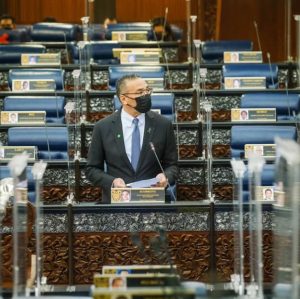Malaysia’s government has expressed hopes that Southeast Asian nations will be able to establish a clear consensus on the new trilateral security partnership between Australia, the United States, and Britain at its upcoming summit.
AUKUS, as the partnership is known, which will see Australia equipped with a fleet of nuclear-powered submarines, has stirred some anxieties in the region. The purpose of the partnership is to engineer a joint Anglosphere effort to curb and contain China’s growing power and ambition.
Malaysia’s Defense Minister Hishammuddin Hussein told parliament yesterday that the upcoming summit of the Association of Southeast Asian Nations (ASEAN) would present an opportunity for the bloc to agree on a shared response to AUKUS. “Our endgame as always is to ensure the region’s stability, regardless of the balance of powers (between) the U.S. or China,” he said, according to Reuters. “An understanding at ASEAN will help us in facing these two major powers.”
The AUKUS partnership has met a mixed and ambivalent reception in Southeast Asia, where many nations are close trade partners of China while also relying on the U.S. security presence in the region, and are leery of a new Cold War between the two superpowers.
The most unabashedly positive response came from the Philippines, which despite the deviant presidency of Rodrigo Duterte, continues to hew closely to its former colonial ruler. Foreign Secretary Teodoro Locsin praised the arrangement, and said that “the enhancement of a near abroad ally’s ability to project power should restore and keep the balance” in the region.
In their public remarks, other nations were more cautious. Shortly after the announcement of AUKUS, Indonesia said that it was “deeply concerned about the continuing arms race and power projection in the region.” Meanwhile, Malaysia’s Prime Minister Ismail Sabri Yaakob, said that the AUKUS pact could “provoke other powers to take more aggressive action in this region, especially in the South China Sea.” He added that it could be a “catalyst for a nuclear arms race in the Indo-Pacific region.”
Other nations have taken a wait-and-see approach, which makes sense, given that the first of the Australian submarines are unlikely to be deployed until at least the late 2030s. Singapore expressed hopes that the deal “would contribute constructively to the peace and stability of the region and complement the regional architecture,” while Cambodian Foreign Minister Prak Sokhonn said that his country “expected that AUKUS will not fuel unhealthy rivalries and further escalate tension.” The latter statement was especially notable for its balance, given Cambodia’s reputation for doing Beijing’s bidding within ASEAN.
Hishammuddin’s call for an ASEAN consensus on the issue was perhaps an attempt to walk back his proposal for an immediate working trip to China to discuss Beijing’s views of AUKUS, an announcement which garnered a good deal of criticism from foreign policy analysts.
In any event, an ASEAN consensus on AUKUS would certainly be welcome, and while Southeast Asia has struggled to reach a consensus on complex and fraught issues such as the ongoing crisis in Myanmar, there is no good reason why the bloc will not be able to establish a joint position on the partnership at its upcoming summit.
How substantial such a consensus can be remains unclear, given ASEAN’s tendency toward broad, shallow agreement on sensitive topics. As Collin Koh of the S. Rajaratnam School of International Studies at Singapore’s Nanyang Technological University noted yesterday, “what we may well end up with is a joint statement that uses bland, standard boiler-plate language” and is therefore “devoid of real meaning.”
Indeed, the further the bloc pushes into specifics, the greater the likelihood that it will run up against the divergent perceptions and interests of its 10 member states. But a lowest-common denominator consensus would only represent the beginning of ASEAN’s attempts to formulate a joint approach to the burgeoning superpower rivalry of which AUKUS is merely the most recent manifestation. That will require both, more creative regional diplomacy and the sort of far-sighted national policy making that unfortunately remains in scarce supply in Southeast Asian capitals today.













